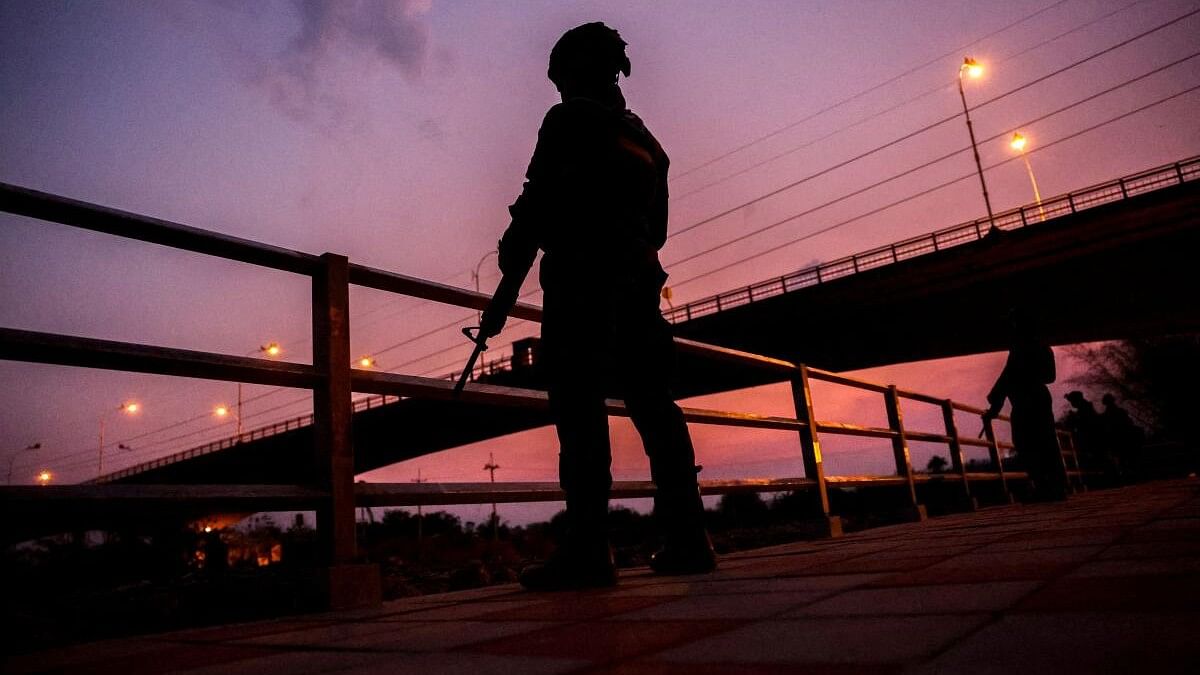
Military personnel stand guard as hundreds of refugees crossed over the river frontier between Myanmar and Thailand on Friday, following the fall of a strategic border town to rebels fighting Myanmar's military junta, in Mae Sot, Tak province, Thailand, April 13, 2024.
Credit: Reuters Photo
The Myanmar junta has admitted to feeling the heat. According to reports, the junta has moved the 78-year-old Aung San Suu Kyi, who was serving a sentence of 27 years in solitary confinement in a Naypitaw jail, and Win Myint, another leader of the National League for Democracy (NLD) to “house arrest”.
A junta spokesman attributed this and the pardon to over 3,000 other prisoners to a heatwave sweeping through Myanmar. But it is not just the weather that has spooked the Generals.
Over the last few months, the junta, which seized power in a coup in February 2021, has lost a lot of territory to ethnic armies who have joined hands with the armed democratic resistance. In the most recent fighting, the Karen National Union, an ethnic militia in Kayin state seized Myawaddy, a town on the border with Thailand.
The resistance militia has also launched drone attacks on top Generals at military bases, including on the home of Senior General Min Aung Hlaing in the capital, Naypitaw, signalling that the war is moving from the ethnic margins to the Bamar heartland.
The People’s Defence Force (PDF), the armed wing of Myanmar’s National Unity Government (NUG), a “government-in-exile”, has been able to up the resistance. In October, a coalition of three ethnic armies seized a network of towns and villages in Shan state. The next month, Chin forces ousted Myanmar soldiers from bases along the border with India. Earlier this year, the Arakkan Army took control of large parts of Rakhine and Chin. Thousands of soldiers have deserted the junta, and many have joined the PDF groups across the country. Desperate, the junta announced conscription, which in turn has sent thousands of Myanmar youth fleeing into Thailand.
The junta may be mistaken if it now believes it can strike a deal with the NLD and return to a power-sharing arrangement with civilians, while retaining an upper hand, such as the one that existed before the coup. Having come this far, the NUG, which has constituents other than the NLD, most of them parties representing minority ethnic border states, can accept such an arrangement only at the risk of the country breaking up. International actors such as China and Thailand now seem to recognise this.
Delhi has been behind the curve on the developments in Myanmar, deciding to throw in its lot with the junta, even dropping the pretense of boilerplate calls for a “return to democracy”. This, despite the reality that the Generals and their power-grab are responsible for the instability on India's own borders in the North-East, and the upending of its ambitious connectivity projects in Myanmar. But it is still not too late. Delhi's security czars must look beyond Naypitaw and reach out officially to the country's democratic forces.